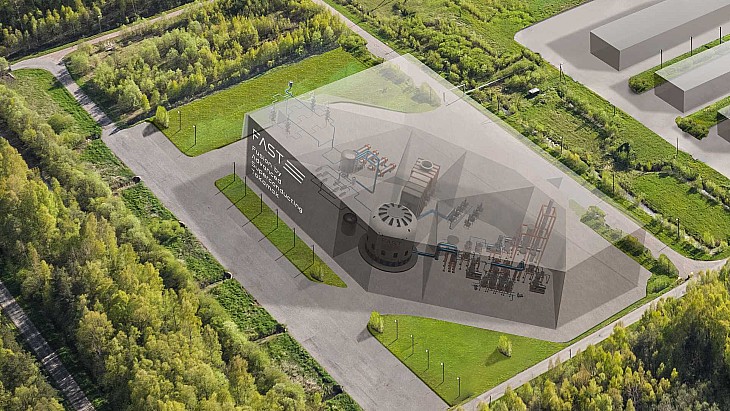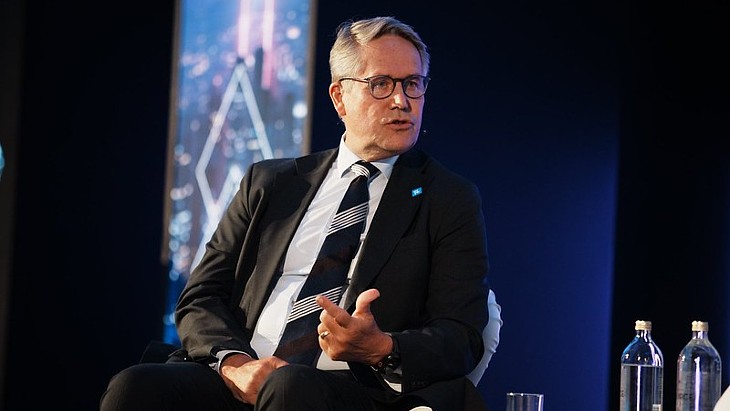Euratom, the nuclear watchdog of the European Union, has approved a contract between Hungary and Russia on nuclear fuel supply for the Paks II expansion project. At a press conference yesterday, János Lázár, Prime Minister Viktor Orbán's chief of staff, said the European Commission (EC) had officially informed the Hungarian government the same day that the Euratom Supply Agency (ESA) has signed the contract between the two countries.
.jpg) |
| János Lázár, cabinet chief of Prime Minister Viktor Orbán, at the press conference (Image: Gergely Botár, Prime Minister's office) |
All obstacles to maintaining the capacity of the Paks nuclear power plant have been removed, Lázár said, according to a statement issued by the prime minister's office.
"It is no longer a question of whether maintaining the capacity can be realised; the question now is how it is going to be realised," Lázár said. The project has not fallen behind schedule and construction work may start in 2018, he added.
News reports in recent months that the ESA and the EC had blocked the agreement between Hungary and Russia were unfounded, Lázár said, and "in fact all parties aimed to cooperate in order to settle the difference of opinion".
"As a result of constructive negotiations, the European Commission has signed the Hungarian-Russian agreement, thus discussions on this matter have been concluded," according to the statement.
It was "a great success for the Hungarian government to convince the EC that the agreement concerns Europe's security of energy supply and Hungary's energy and gas independence, and not increasing Hungary's dependence on Russia," Lázár said.
Hungary has concluded three agreements with Russia - on the construction of the nuclear power plant; on its operation; and on the supply of nuclear fuel for the facility. The EC's direct approval was necessary for the third agreement, Lázár said.
Hungary is still in talks with the EC on two other issues that need to be clarified, he said, concerning competition law and procurement. Consultations on these issues could take "as much as" another six months.
Throughout the implementation of the project, contractors must be chosen in a way that complies with EU public procurement regulations, he said. This requirement is "in line with the intentions of the Hungarian government and with the interests of Hungary", he added.
The first new unit is to be commissioned in 2023, with the second following about two years later.
According to the Portfolio news agency, Lázár told reporters that the contract stipulates Hungary may send used fuel from the Paks plant to Russia.
An intergovernmental agreement signed in early 2014 would see Russian enterprises supply two VVER-1200 reactors at Paks, as well as a loan of between €10 billion ($10.5 billion) and €12 billion ($12.6 billion) to finance the majority of the project. Following talks in February with Russian President Vladimir Putin, Orbán said the Russian state loan would be tied neither to the rouble, nor the forint. "This is good news for everyone," he said. Orbán would not state that it would be linked to the euro, saying merely that "the financial terms and conditions are in order".
While it is normal for vendors to supply a new reactor's first load of fuel as well as some subsequent reloads, rules in the European Union require all power plants to have more than one fuel supplier in the long term. The ESA ensures this common policy on fuel supply in the nuclear sector, overseen by the EC, which must countersign any significant nuclear fuel contract for it to comply with EU law. According to presentations available online, the ESA's aim is to prevent any EU consumer of nuclear fuel from becoming "over-dependent on any external source". In recent months this requirement has been underlined by the EU's new Energy Union initiative, which seeks to improve energy security overall for the 28 nations of the bloc.
Paks currently comprises four Russian-supplied VVER-440 pressurized water reactors, which started up between 1982 and 1987. Though originally 440 MWe gross, the units have been upgraded and will be modified further to give 500-510 MWe gross.
Researched and written
by World Nuclear News




_82983.jpg)
_34792.jpg)
_16403_79272.jpg)


_76087_55556.jpg)



